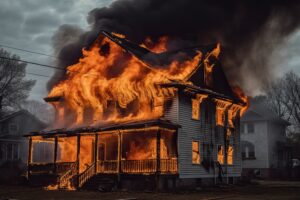Arson harms not only property but can also inflict emotional and financial wounds on homeowners. A particularly distressing issue for victims is realizing that claims for insurance concerning intentional fires are frequently rejected. But what is the reason for this? Why doesn’t insurance cover arson, and in what ways can you safeguard your assets and get ready for the unforeseen?
This blog will explain why insurance policies exclude arson, why doesn’t insurance cover arson, outline how investigations work, and offer practical steps to reduce risks and recover should an incident occur.
Understanding Homeowners Insurance
What Does a Standard Policy Cover?
Homeowners insurance is designed to safeguard your residence and possessions from unforeseen and inadvertent damages. Although policies differ, a typical plan generally includes:
- Fire Damage: Fires caused by accidents, electrical failures, cooking mishaps, or natural factors like lightning.
- Theft and Vandalism: Compensation for stolen items or malicious property damage.
- Natural Disasters: Coverage for storms, hail, and wind damage (note that floods and earthquakes usually require separate policies).
- Liability Coverage: Financial protection if someone gets injured on your property or if you accidentally damage someone else’s property.
While homeowners insurance addresses many emergencies, it distinctly excludes intentional acts such as arson.

The Arson Exception
Why Doesn’t Insurance Cover Arson?
Arson is excluded from coverage because insurance is designed to address accidents—not deliberate acts. Here’s why insurers draw the line:
- Preventing Fraud
If insurance covered homeowner arson, it could encourage dishonest behavior wherein property owners set fires intentionally to collect payouts.
- Avoiding Higher Premiums
Fraudulent arson claims would increase costs for insurers, and this would eventually drive up premium rates for all policyholders.
- Maintaining System Integrity
Omitting deliberate actions aids in making policy terms just and equitable, emphasizing integrity and valid claims.
This exclusion helps preserve fairness and affordability within the system.
The Burden of Proof in Arson Cases
Who Has to Prove Arson?
When arson is suspected, insurance companies bear the burden of proving it was intentionally set and connected to the policyholder. Their process typically includes:
- Fire Scene Investigation
Experts analyze the site, identify accelerants, burn patterns, and evaluate the origin of the fire.
- Financial Records Examination
Insurers frequently examine the homeowner’s financial condition to identify possible motivations such as debt or economic instability.
- Witness Statements
Neighbors, first responders, or other witnesses may provide valuable evidence during the investigation.
- Review of Claim History
A history of questionable or excessive claims can raise red flags.
Partnerships between insurance investigators and law enforcement guarantee a detailed and all-encompassing investigative procedure.
Exceptions and Scenarios
Are There Circumstances Where Arson is Covered?
While intentional arson by the policyholder is usually excluded, there are rare exceptions where insurance kicks in:
- Third-Party Arson
If a person other than the policyholder, like a tenant or stranger, ignites the property, the damages are usually covered.
- Coercion
Arson carried out under coercion might qualify for coverage, but this is contingent on particular details of the case and assessments by the insurer.
- Lack of Evidence
If authorities can’t convincingly demonstrate that the arson was deliberate or linked to the policyholder, insurers might have to pay for the damages.
Understanding the details of your policy and situation can help determine if exceptions are relevant to you.
Tips to Protect Your Property from Arson
Reducing your risk of arson starts with prevention. Here are six actionable steps:
- Install Security Systems
Modern alarm systems and cameras not only deter arsonists but also help gather critical evidence.
- Brighten Your Home with Lighting
Well-lit areas are less appealing to potential vandals or intruders.
- Secure Doors and Windows
Reinforce entry points with high-quality locks to make unauthorized access more challenging.
- Store Flammable Materials Safely
Flammable items like gasoline or paint should be stored securely in designated, non-residential spaces.
- Monitor Vacant Properties
Regularly inspect secondary homes, such as rental or vacation properties, to ensure they remain secure.
- Build a Neighborhood Watch
Partner with neighbors to establish a community surveillance system that deters suspicious activity.
These precautions not only protect your property but also bolster your peace of mind.
What to Do If Arson Occurs
Recovering from an arson incident can be overwhelming, but a clear plan can simplify the process. Here’s what to do:
- Notify Emergency Services
Call 911 immediately to report the fire and ensure the safety of everyone involved.
- File a Police Report
Official documentation is critical for both legal and insurance purposes.
- Contact Your Insurance Provider
Start the claim process promptly—even if coverage is uncertain. Partial damages or assistance may still apply.
- Document Everything
Take photos and videos of property damage and keep receipts for emergency expenses like temporary lodging or repairs.
- Seek Legal Advice
If your claim is denied or you are accused of involvement, consult with an attorney specializing in arson cases.
- Get Emotional Support
The effects of arson extend past the material. Contact family, friends, or mental health experts for assistance throughout the healing journey.
With a level-headed approach, you can regain control and rebuild efficiently.
Protect Your Home Through Awareness and Action
Insurance serves as an essential safety measure, yet grasping its constraints is crucial for readiness against unexpected events such as arson. By actively protecting your assets, understanding what insurance policies include, and knowing how to sell a fire-damaged house, and responding quickly during crises, you’ll be more prepared to secure your residence and recover.
Previous